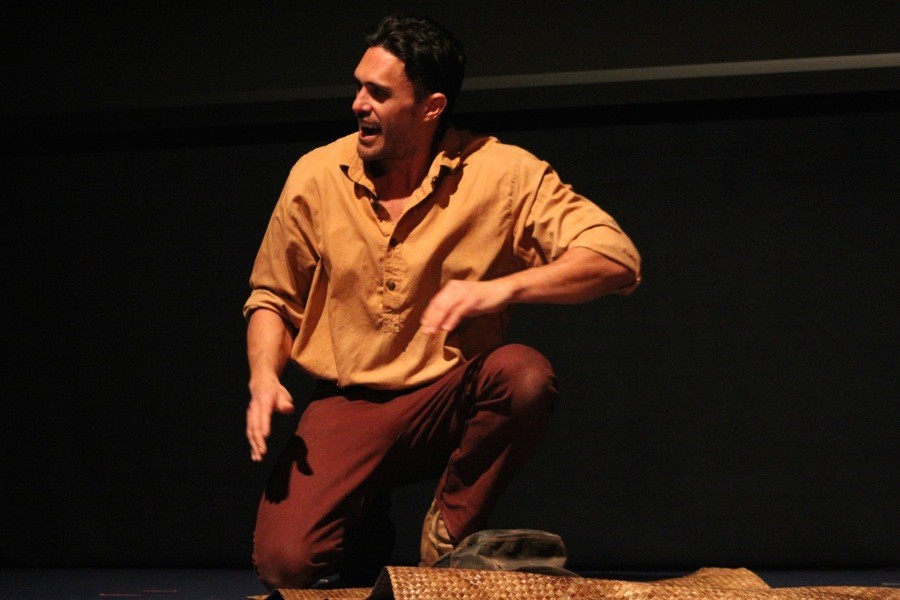‘Legend of Koʻolau’ enthralls student audience
one man’s odyssey through Hawaiian cultural turmoil
Photo by Quinn Williams
Moronai Kanekoa portrays a rebel Hawaiian cowboy of Kauai in The Legend of Koolau, playing Friday, May 8, at the Ritz Carlton Kapalua.
May 6, 2015
High school students, faculty and staff gathered Monday afternoon to watch the show they had been whispering about all day, the one-man play The Legend of Koʻolau, which was performed in Keōpūolani Hale in advance of a one-night appearance at the Ritz Carlton Kapalua this Friday, May 8.
The story was set in 1893, during the chaos and loss of Hawaiian sovereignty and monarchy. Koʻolau, the lead and only character, was misconstrued as a rebellious leader, fought militia responsible for the overthrow of the Hawaiian kingdom and also militia that were enforcing new leprosy laws, which would have forced him and his son to move to Kalaupapa, “the Living Grave,” and join the rest of leper settlement.
“I was attracted to the play because it was a common man, a working man,” playwright Gary T. Kubota said.
“Kings and queens and movie stars, they get their names in the lights, but someone like him who is just an ordinary person and fall into extraordinary circumstances and become a legend of sorts,” said Kubota, who is also artistic director.
Directed by Monte Scott Perez, The Legend of Koʻolau stars Moronai Kanekoa, a University of HawaiʻI region scholar, as Kaluaikoʻolau, a Hawaiian cowboy and “rebel” from Kauaʻi.
Kanekoa was one of many actors who auditioned for the part, but he was the only one to memorize the entire play in three weeks “and that’s why he got the part,” Kubota said about Kanekoa’s dedication to the role.
According to Kubota, there are more than twice as many lines in this one-man play than in Hamlet’s speeches in Shakespeare.
Originally, the play was going to be written as a film script, but later, Kubota realized that it had much appeal as a one-man play.
The play overall took about 6 months and lots of time-consuming research to write. During the research process, Kubota found himself going through 2 years of Honolulu Advertiser and The Pacific commercial advertiser newspapers for any information he could find about Koʻolau.
He also went through state archives and the Records of the National Guard Bureau for documents and pictures. While in the National Guard, home guard records, Kubota found records of a lieutenant who recorded each day spent trying to capture Koʻolau.
“The descriptions were actually day-to-day accounts of what happened,” he said.
In 2013, Kubota received a National grant through the Maui Arts and Cultural Center and used the money toward producing the play.
The show will play for one night at the Ritz Carlton Kapalua this Friday, May 8 at 7:30 p.m.. Tickets are available through their concierge. The play will also reach the University of California Berkley campus in October 3-4.




Ms. Kim Haina • May 7, 2015 at 5:56 am
Riveting! Those of us in the mainland appreciate when you use your “voice” to keep us informed of campus activities. This coverage of “Koolau” makes available to me a way to convey on our California campus how the history and culture in Hawaii is preserved through artistic presentation. Mahalo for the article and the video coverage. Imua!